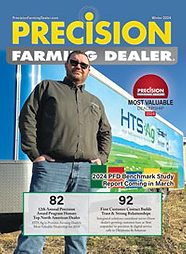In less than a month, hundreds of visionaries, researchers and novices will descend upon the Midwest for the 11th International Conference on Precision Agriculture.
This year’s conference, held July 15-18 at the Hyatt Regency in Indianapolis, will cover 18 different topics, including precision nutrient management, sensor application in managing in-season crop variability and information management and traceability.
Some of the conference highlights include oral and poster presentations, discussion forums and a focused session entitled “Precision A to Z” designed to provide practical advice and training from international experts on key topics of precision agriculture for producers and professionals.
While the conference is broadly designed to promote efficient crop management through the use of precision technology, Colorado State Professor Raj Khosla, conference chair and President of the International Society of Precision Agriculture, said there are several sessions that will be specifically geared toward precision equipment dealers.
One especially hot topic, Khosla said, will be machine vision, or the use of digital imaging for measurement, inspection and control of fields and horticultural crops.
“Using automated, semi-robotic machines that have multiple cameras that go around the field or orchards monitor crops and allow operators to make better decisions,” Khosla said. “We will have two sessions on guidance robotics and automation.”
The sessions will focus on increased interest among farmers in auto-guidance and high-resolution GPS systems and whether or not systems are worth the money and what types of new technology is still in the research stage.
Another emerging area of precision technology to be discussed in depth at the conference is remote sensing.
There will be several featured sessions on the topic, Khosla said, going beyond simply measuring temperatures, but looking also at nitrogen deficiencies and pest monitoring.
“A huge emphasis among scientists and farmers is measuring crop canopy reflectance, to predict how much grain yield will happen at the end of the year,” he said, “and how much nitrogen needs to be applied in order to meet nutritional needs of the crop.”
One of the newer areas of precision that will be discussed at the conference is how to spatially manage water application, based on specific crop need.
“It’s always been managed based on time,” Khosla said. “But the entire field does not need same amount of water. How do we go about applying different water amounts across the field?”
The event is expected to be the largest gathering of key players in the precision agriculture world, according to Khosla, who said in excess of 500 people from more than 45 countries, will be on hand.
In addition to the conference presentations scheduled throughout the four-day conference, exhibitors will display and demonstrate the latest precision agriculture technology to attendees.
On July 17, there will be a luncheon awards presentation recognizing the achievements of a young and senior scientist with the Pierre C. Robert Young and Senior Scientist Awards. Two awards will be given to individuals who have made significant contributions to precision science and technology.
There will also be several awards in the graduate student category to recognize student work and encourage participation in the ICPA.
For full conference information, including registration forms, conference outline and list of discussion topics, visit www.ispag.org/icpa. A discounted registration fee is available for practitioners, crop advisors and farmers. Login online today and take advantage of the early bird registration fee.






Post a comment
Report Abusive Comment